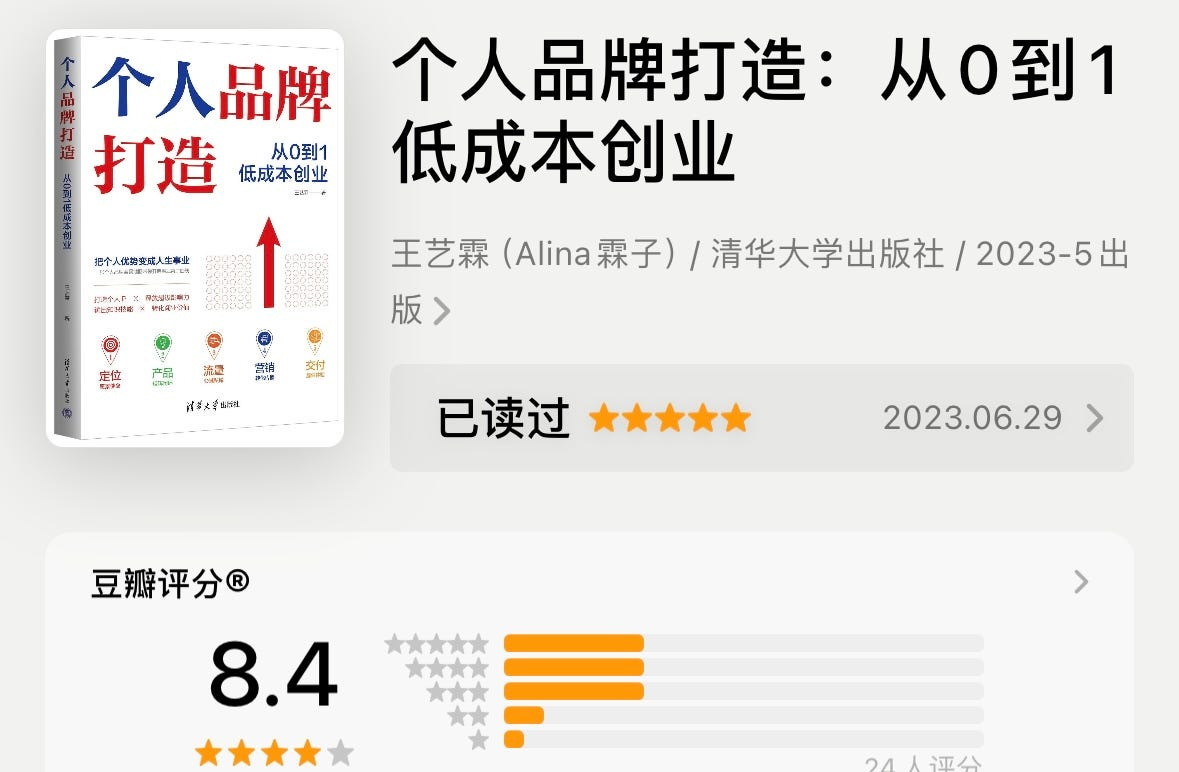The Death of the Personal Brand: Why Authenticity and Systems Will Define the Future of Creative Work
 Alina Linzi
Alina Linzi
Many people create personal brands not to convey deep value, but to make money. They focus excessively on high-return topics, repeatedly pushing the same content, trying to expand their influence by attracting more followers, but the actual value added is minimal. These “brands” gradually lose their depth and soul, becoming empty shells, tools for short-term profit.

Photo by Alina Wang in New Zealand
In the early days of the internet, creating content was an act of passion. Individuals picked up cameras, pens, or microphones to share their knowledge and joy for life with the world. Personal branding was the golden ticket — a way to break free from the constraints of traditional careers and live a life driven by curiosity. But somewhere along the way, things changed. The personal brand has lost its meaning, diluted by the pursuit of monetization, algorithms, and superficial metrics.
Over the past two years, I have coached more than 100 global partners in building personal brands and published 《Personal Brand Building — From Zero to One Low-Cost Entrepreneurship》in China.
Freepreneur Collective by Alina Wang is a reader-supported publication. To receive new posts and support my work, consider becoming a free or paid subscriber.
Subscribed

My book published in China
However, it seems everything has changed this year. As more founders begin to build their personal brand online, the public’s understanding of personal branding has gradually become diluted, buried in the flood of profit-seeking, algorithm-chasing, and superficial metrics.
We’re now at a critical juncture in the creative world, where authenticity is no longer a luxury — it’s a necessity. The personal brand, as we once knew it, is dead. But in its place, something much more profound is emerging: the creator as a system builder, focused on long-term impact, not short-term gains.
Let’s break down why this is happening, and more importantly, how you can thrive in the new era of creative work.
1. The Rise and Fall of the Personal Brand
A few years ago, building a personal brand felt like tapping into an endless opportunity. Platforms like Instagram and YouTube turned ordinary people into celebrities, and the personal brand became a path to both financial freedom and personal fulfillment.
The idea was simple: package your personality, skills, and interests into a brand, share it with the world, and attract a tribe of people who resonate with your message. At its peak, the personal brand was a way for individuals to escape the rigid structures of traditional employment, create work they cared about, and monetize their passions.
But as more people entered the creator economy, the landscape shifted. What started as a beacon of hope for aspiring creators turned into a chase for followers, engagement rates, and sales funnels. Personal brands became businesses, and businesses need profit to survive. Soon, the pursuit of financial success overtook the desire for authenticity, leading many creators to prioritize content designed for algorithms rather than human connection.
The problem? The soul of creativity got lost in the noise.
The personal brand is no longer personal. It’s a commercial endeavor, optimized for SEO, algorithm hacks, and cookie-cutter templates that guarantee “success” but strip away originality. Audiences are beginning to see through this façade. They crave something deeper. The old ways aren’t working anymore.
2. The Problem with Influencers and Content Creators Today
The influencer industry is the perfect example of this shift. At its worst, influencers don’t create for impact; they create for clicks. Their goal isn’t to educate, inspire, or solve problems. Instead, they promote products with little value, adding to the clutter of consumerism without contributing anything meaningful.
You’ve seen it — influencers promoting the latest fad diets, useless gadgets, or hyped-up products that do more harm than good. They grab attention with flashy visuals, but when you strip away the filters, there’s nothing left. No depth, no real message.
As attention spans shrink and superficiality takes over, influencers are faced with a crucial choice: evolve or become irrelevant.
Creators who focus only on surface-level engagement and quick monetary wins risk becoming irrelevant as their audiences look for deeper, more meaningful connections. This doesn’t mean selling products is bad. Business and creativity can — and should — coexist. But if all you do is push products for a quick buck, you’re not creating. You’re just adding to the noise.
The solution is to create something that matters, something that lasts beyond fleeting trends. But how?
3. Systems Thinking: The Future of Creative Work
The death of the personal brand doesn’t mean the end of creators. Quite the opposite. It signals a new beginning — one where creators don’t focus on vanity metrics like followers and likes but instead on building systems that allow them to do meaningful work for the long haul.
What does this mean in practice?
First, let’s redefine what it means to be a creator. You’re not just someone who posts content online. You’re not simply an “influencer” or “content creator” bound to the whims of social media algorithms. You’re a system builder.
Being a system builder means thinking of your creative work as part of a larger ecosystem. Your goal isn’t to just attract attention — it’s to build a body of work that stands for something. It’s to build systems that ensure long-term success, independence, and sustainability.
4. Building a Vision: More Than Just Content
One of the most significant shifts creators need to make is moving from chasing trends to building a vision. A vision is bigger than any one piece of content. It’s bigger than any one platform. It’s a way to navigate your work with purpose.
Let’s say your passion is fitness. Instead of creating endless posts about “the best workout tips” that look just like every other fitness influencer, ask yourself: What unique impact can I make? What long-term change do I want to see in my audience’s lives?
You’re no longer just creating content to gain followers. You’re creating with a vision in mind — a vision that evolves as you do.
Systems-thinking creators move beyond daily content churn. They create for depth, not breadth. They recognize that meaningful work is built over years, not months. And they understand that consistency doesn’t mean burning out by posting every day. It means showing up authentically and consistently across the platforms that matter most to you.
5. The Four Pillars of Creative Work in the New Era
To succeed as a creator in this new world, you need to focus on four pillars: brand, content, product, and distribution. Let’s break them down:
- Brand: Your brand is no longer just your online profile or logo. It’s the world you’re building. It’s how you invite people into your vision. Think of your brand as an experience — everything from your storytelling to your design, your website to your emails, your videos to your newsletters.
- Content: Content is how you communicate your ideas, but it’s also a tool to educate and inspire. In this new era, content isn’t about viral trends. It’s about providing real value. Whether it’s long-form videos, in-depth blog posts, or meaningful newsletters, your content should always align with your vision and be part of a larger system.
- Product: Products are what turn your vision into something tangible. These can be digital or physical, but they should serve as tools that help your audience achieve their goals. The best creators build products based on their own systems and experiences — things that genuinely help people and make their lives better.
- Distribution: This is how you get your content and products into the hands of people who need them. Social media is just one piece of the puzzle. It’s crucial to build systems that allow you to own your audience — email lists, podcasts, courses — and stop relying solely on algorithms.
6. How to Get Started: Building Your System
Here’s the key takeaway: building a sustainable creative career is about creating systems that align with your vision, allow you to produce content consistently, and provide value over time. It’s not about quick wins; it’s about long-term impact.
1. Define Your Vision: What are you building? What long-term change do you want to see in the world through your creative work? Get clear on this before anything else.
2. Create a Content Strategy: Map out your content in a way that supports your vision. Stop chasing trends and start creating content that helps your audience solve real problems.
3. Develop Your Products: Build products based on your own experience and insights. These should help your audience achieve the change they’re looking for — be it a course, a book, or a digital tool.
4. Master Distribution: Build an audience by owning your platforms. Don’t rely solely on social media; instead, focus on creating email lists, podcasts, and long-form content that provides value over time.
The Future of Creative Work
The personal brand as we once knew it may be dead, but the future of creative work is brighter than ever. Authenticity, systems, and vision are the keys to building something that lasts. As a creator, you have the opportunity to build more than just a brand — you can build a legacy.
The world doesn’t need more influencers or shallow content creators. It needs individuals with purpose, who create with a long-term vision in mind. So, step back from the noise. Reevaluate what you’re building. The future belongs to creators who think beyond the brand — creators who build systems, who focus on depth, and who are committed to doing work that matters.
Subscribe to my newsletter
Read articles from Alina Linzi directly inside your inbox. Subscribe to the newsletter, and don't miss out.
Written by
Alina Linzi
Alina Linzi
我是 Alina霖子,自由人生教练平台创始人,ICF认证教练、个人品牌专家。我帮助全球的独立教练、自由职业者和数字创作者通过个人品牌实现商业变现与自由人生。已帮助1000+人找到职业第二曲线,学员遍布10多个国家。欢迎加入自由人生教练平台,一起开启自由丰盛的生活! I’m Alina Wang, founder of the Freedom Life Coach Platform, ICF-certified coach, and personal branding expert. I help independent coaches, freelancers, and digital creators globally build personal brands and achieve financial freedom. Subscribe to my Substack Newsletter: Freepreneur Collective, for insights on personal branding, freelancing, and digital entrepreneurship!